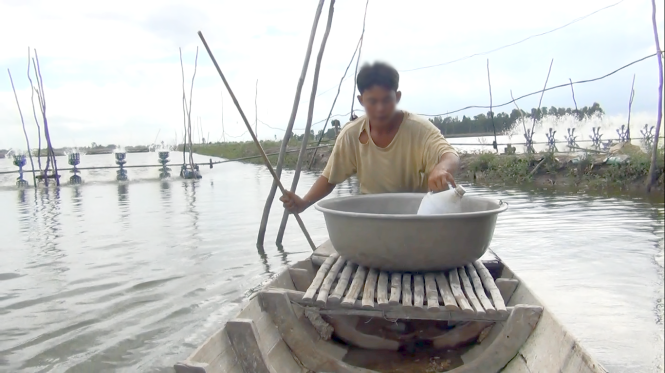Farmers in the Mekong Delta region of southern Vietnam are willing to add salt to their freshwater ponds in order to cultivate shrimp, a practice experts say can destroy the local ecosystem.
They raise giant river prawns, which live in fresh water, and white leg shrimp, whose habitat is in brackish water, which contains more salinity than fresh water, but not as much as sea water.
With white leg shrimp now a sought-after item, farmers have been jostling to raise them, despite living in areas surrounded by fresh water.
Locals have therefore begun throwing salt into their freshwater ponds to increase their salinity and farm the highly valued white leg shrimp.
There are now hundreds of hectares worth of shrimp farms employing this trick in the Mekong Delta, mostly in Dong Thap Province.
According to the provincial agriculture department, there are some 176 hectares of white leg shrimp farms in Dong Thap, 165 hectares of which are in Tam Nong District alone.
Tam Dong is considered the hub of giant freshwater prawns. However, many local farmers have been lured by the lucrative market for white leg shrimp and have therefore ‘altered’ their freshwater farms.
Elsewhere in Ben Tre, Soc Trang and Kien Giang Provinces, farmers have been raising brackish water shrimp in areas previously home to freshwater prawns.
N.V.G., one farmer in Tam Nong, said he was forced to follow the trending demand for white leg shrimp because “catfish prices keep falling, and raising king prawns is unprofitable.”
“I heard that yields from a 3,000-sqm shrimp farm are equal to those of a 100,000-sqm paddy field, so I decided to get into the game,” he said.
G. said it was no big deal to alter the salinity profile of his ponds.
“The water lacks salinity? I will throw salt in. Not enough alkaline phosphate or lime level? Well, everything can be added to the water,” he said.
N.V.D., another farmer in Tam Nong, said he had converted his entire three-hectare river prawn farm into a white leg shrimp farm.
“You can recoup your money faster with the white leg shrimp,” he said, adding that traders were willing to buy all his products, regardless of quality.
Ho Thanh Dung, deputy director of the agriculture department of Dong Thap, said that there was no ban on the cultivation of brackish shrimp in the province.
“However, it is not a practice we encourage farmers to take on,” the official added.
Dung said there were no immediate statistics on the number of cases where farmers had added salt to their freshwater ponds. “It’s difficult to verify things like this,” he said.
The deputy department head said a scientific study was needed to make conclusions on whether turning freshwater ponds into brackish ones would affect the local ecosystem.
In the meantime, Assoc. Prof. Duong Nhut Long, dean of the aquaculture department at Can Tho University, said raising white leg shrimp in unnatural brackish water will result in low-quality yields.
“The wastewater from these farms, once released into the environment, will ruin the freshwater ecosystem there,” he warned.
Long said Thailand had attempted this practice more than ten years ago and eventually decided to stop.
“Authorities should encourage farmers to take up raising river prawns or fish in paddy fields, rather than white leg shrimp,” he advised.

























































